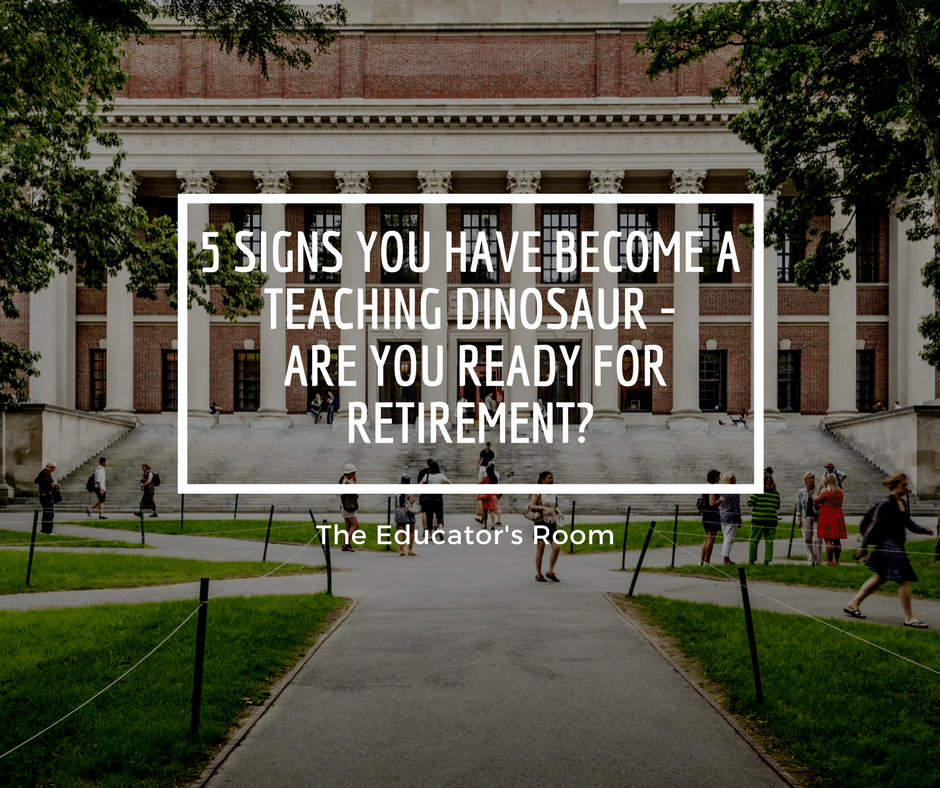Gather ye rose-buds while ye may,
Old Time is still a-flying;
And this same flower that smiles today
Tomorrow will be dying.
The glorious lamp of heaven, the sun,
The higher he’s a-getting,
The sooner will his race be run,
And nearer he’s to setting.
It happens suddenly in the course of a teaching career, usually without warning. Like a meteor, a stomach ailment, or a shocking election outcome, it generally catches a teaching veteran off guard, propagating a mental state somewhere between a tepid daze and potent delirium.
Unsettling thoughts abound…
“Man, who are these students I’m teaching?”
“This school isn’t what it used to be!”
“I don’t understand half the things my students are saying. Sorry I’m not ‘woke.’”
“Ok, ok, let me get this right: What I’ve been doing 20 years is all wrong but this next reform is THE answer? Riiiiight.”
Sign #1: You suffer from compassion fatigue. Anyone new to the teaching profession quickly learns that there are moments in the classroom that can dazzle and delight, moments that transcend the banal. To truly impact another human being’s life in a substantive and substantial fashion—possibly to the extent that lives are genuinely “changed”—is a joy reserved for precious few professions. Sadly, new teachers also quickly learn that the classroom is not insulated from the horrors of the outside world. Poverty, systemic neglect, backgrounds infused with endless social and psychological pathologies, can quickly shatter a new teacher’s hopes of what he or she can achieve. To feel the pulse of both the summit and the nadir is to know the full spectrum of the teaching profession.
And yet, as the year’s pass, sometimes this pulse grows fainter. As Dr. Cheri Brown Sizemore, author of To Love To Teach Again has noted, “Simply put, compassion fatigue can develop when one cares ‘too much’ for another who has shared firsthand traumatic experiences. It is a unique form of burnout, previously linked with nursing professionals, therapists, and early responders, that has been described as “the cost of caring” for others’ in emotional pain.” It doesn’t mean you don’t care. It doesn’t mean you want to stop making a difference. It doesn’t mean you don’t have your heart broken by your students every now and then. But realism sometimes equates to stoicism, no matter how much you love your job and your students.
[bctt tweet=”It doesn’t mean you don’t care.” username=”EducatorsRoom”]
Sign #2: When faced with classroom failure you stop innovating. It is the most annoying fixture of a teaching career: to love a lesson, a unit, or an activity, to look forward to it all year as if it were a holiday or a birthday, and then, without warning, it flops. There are two approaches to confronting this harsh reality: blame the students or go back to the drawing board. The eagerness to look in the mirror, make adjustments—sometimes large, sometimes small—simply diminishes as a career progresses. The time involved, the lack of any guarantee of success, and the temptation to blame external realities all loom large in this particular sign. It is nothing to be proud of, but rest assured, it happens with increasing frequency as teachers advance in their careers.
Sign #3: You can remember when teaching was about education. Nowadays it seems teachers are expected to be all things to all populations. If our colleagues are not pulling their weight, then it is the “professional learning community” to the rescue. If students are defiant or disrespectful, it is the teacher who must get to the heart of why a student is acting out and help them to develop coping strategies. Teachers must also master the nuances of anxiety and depression, know how to respond to the potential of a school shooting, be familiar with everyone’s differentiated learning situation, keep up on parent communication, technology trends, testing deadlines and the list goes on and on. As one of my colleagues recently observed, “it seems the actual curriculum comes last on the job these days.”
Sign #4: You don’t get caught up in the “latest” teaching crazes anymore. Shrugs. It’s the hallmark of the teacher who now feels like a dinosaur. But just because you are not screaming a steady torrent of “Hallelujahs” and “Hosannas” does not mean you don’t see value in new methods or technologies. The shrug is simply a mature capacity to put new ideas in their proper place in the teaching cosmos. New ideas and strategies are great but don’t try to sell it as a panacea. Academia, public policy experts trying to “think outside the box,” and educational publishers constantly re-invent what is “supposed” to be done in the classroom because they operate under the false hope that “the solution” is akin to a new drug or scientific theory, they believe the elusive cure to education is “out there,” that there really is a magical elixir or holy grail or educational ark to find. Dinosaurs know better: most of the time teachers actually know best how to teach their students.
Sign#5: You check your state’s retirement calculator a few times a year. Pension concerns are not even a blip on the radar screen of a new teacher’s life. But to those approaching the splendorous possibilities of retirement, the magical retirement calculator of one’s pension system is a seductive web address, virtually always bookmarked on a 50-something-year-old’s computer.
BONUS: You are EXHAUSTED at the end of the day. My friends at this stage of their careers speak of “indescribable exhaustion” and a fatigue that goes beyond the periphery of traditional complaints. They can remember having enough energy at the end of the teaching day to go run errands, work out, or do whatever they wanted. Now their voices hurt, it hurts every time they pick up a dropped pen, and the list could go on and on.







Oh yes, that EXHAUSTION. Three years ago I could not stop the “exhaustion nausea” until July. Go out after teaching all day, planning for hours and hours, grading more hours? Oh, no… it was enough to brush the teeth before bed. There’s no tired like teacher tired. You are never done with the work.
Thank you for your insight.